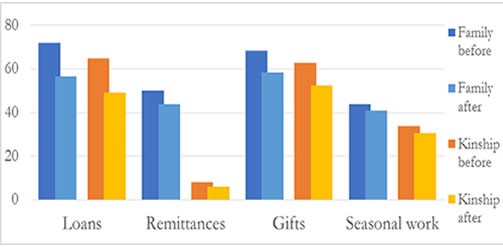Pakistan is not a welfare state. As such, formal social protection is very weak, limited to workers in the formal economy, a small fraction of the population. So people’s coping strategies depend on informal social arrangements mostly through social networks, with a heavy reliance on informal social protection provided through family, kinship, religious and associational groups. Do such informal arrangements get destroyed with a common shock, such as the devastating earthquake of 2005?
High levels of poverty suggest that reliance in informal social protection in Pakistan is not sufficient. Although there has been a recent boost with a national cash transfer – the BISP – that trebled the country’s spending in social protection (mostly to compensate for price shocks, targeting exclusively women in poor households) this is no saviour, as it only provides some relief for daily household expenditures for the poorest of the poor families.
Despite the earthquake, informal social protection did not collapse
Until recently the general assumption was that while households can use informal social protection mechanisms to recover from shocks affecting individuals within a group (known as idiosyncratic), these mechanisms would break down with common shocks (known as covariant) like an earthquake, as everybody is equally hit. New research is coming out questioning this thinking, showing that these mechanisms can be resilient and robust enough to deal with common shocks. And the role of informal networks is crucial for these arrangements to survive.
Of course the 2005 earthquake had an impact in informal social protection, but it did not collapse as could be anticipated, instead playing a crucial role for many families to recover.
Nine months after the earthquake, my LUMS students and I were carrrying out research in the area ((see my earlier blog explaining this research work). We asked villagers from 59 settlements in Khyber Pukhtunkhwa (KP) and Pakistan-administered Kashmir (PaK) to quantify the proportion of households in their settlement that had access to informal social protection pre- and post-earthquake.
Despite some slight differences between KP and PaK – with roughly 10% more households having access to remittances in PaK than in KP and slightly less access to seasonal work – in both regions people share the same kinds of social protection instruments:
- Loans
- Remittances
- Gifts
- Seasonal work
And they access these through either the immediate family or the biradari, the kinship corporate entity.
We found that while less people had access to informal social protection as compared to before the earthquake, only the decrease in loans and gifts was statistically significant. In other words, the earthquake’s impact on the number of people accessing informal social protection was not that drastic.
We also noticed that these instruments are interconnected, particularly loans, gifts, and remittances and – like these regions’ rural economy – dependent on migration and remittances to bring in capital (PDF). So how do people access those remittances?
Earthquake’s Impact on Number of People Accessing Informal Social Protection (%)
Social protection happens through family networks
In Pakistan’s rural areas a great deal of informal social protection is facilitated through the language of kinship, or biradari, with families as the safety net of first resort. But it gets complicated; in villages and settlements where most people belong to the same biradari or where each biradari is very large, and resources are limited, the expression “we help our own” loses its significance, since most people are considered ‘ours’.
So it helps to get closer to those families within your biradari that receive more remittances, in the hope that you can access them as well. In these situations, you don’t use the language of biradari; you use the language of the extended family – the khandan – to create bonds of assistance.
While entering the extended family happens automatically through marriage or blood ties, staying requires active participation in rituals and ceremonies, such as gift exchanges, attending weddings and funerals, and visiting relatives during religious festivals or when migrants come on holidays. In other words, people need to constantly reinforce family bonds.
Belonging to the extended family works as a multiplier effect: not only do you belong (and therefore have access) to your immediate family, but also to other families. Khandan is evoked more often than biradari to, for instance, start a new venture, sponsor migration (migrants first sponsor household members, then other relatives, and then biradari members), be taken care of in old age, and to generally ask for assistance in times of need.
The 2005 earthquake provides a striking example of how this system works; as a sizeable proportion of the capital circulating in this region’s economy came from outside the region through remittances, and these were only shared through the family, it made sense to ‘be’ in as many families as possible. Belonging to the extended family gave households better chances to access other households’ remittances, along with more loans and more seasonal work than through the biradari.
The earthquake did not change the fact that the family continued to be the main source of informal social protection. Just like before, households continued to create, negotiate and reinforce family ties in their everyday lives.
Migration remittances key for recovery
So what have we learnt in general? Well for starters, that remittances are not a panacea; not everybody can ‘eat’ from these, so the state needs to have in place a strong system of social protection.
We also learnt that we need to know how migrant networks and remittance channels function in the region, to identify who’s excluded.
And finally, state and non-state actors should assist migrants abroad and in urban centres to make sure remittance flows are restored as soon as possible, making sure they don’t loose their jobs and keep sending remittances.
